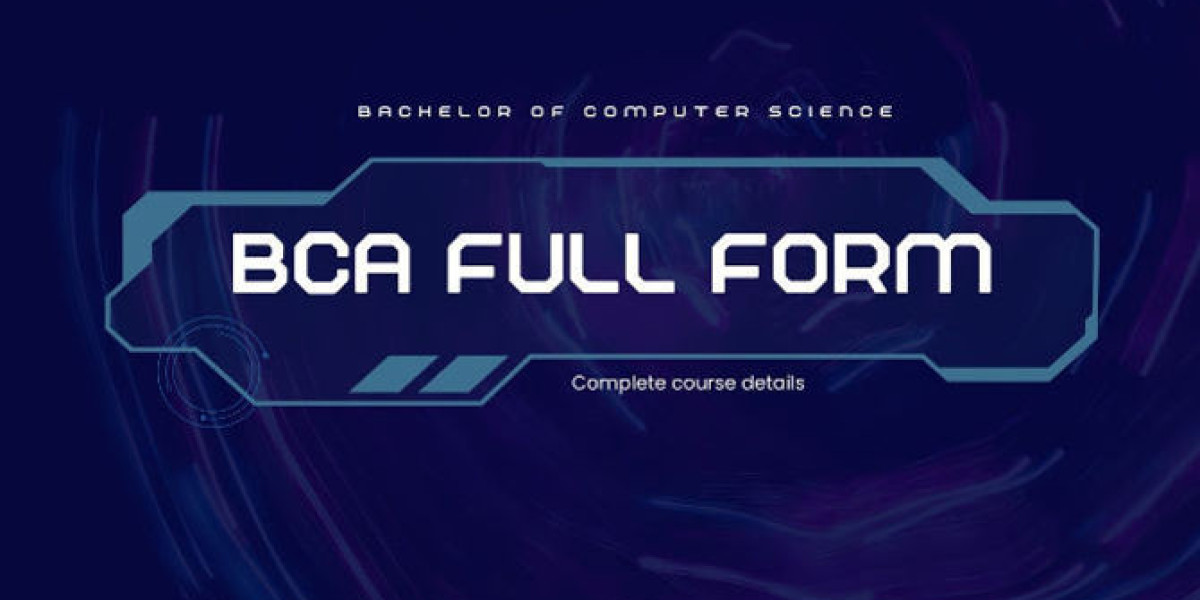The rapidly growing technology sector has made computer-related fields some of the most sought-after career paths in today’s world. Whether it's artificial intelligence, data science, software development, or cybersecurity, the demand for skilled professionals in Information Technology (IT) is at an all-time high. One of the most popular educational pathways for individuals aspiring to enter the IT industry is through a Bachelor in Computer Applications, commonly known as BCA. In this article, we will explore the BCA full form, its significance, and how this degree can play a crucial role in shaping IT careers.
What is the BCA Full Form?
The full form of BCA is Bachelor of Computer Applications. It is an undergraduate degree program that focuses on computer science, software development, and IT skills. The BCA program typically spans three years, although the duration can vary depending on the country or institution. It is designed to equip students with the knowledge and skills necessary for a successful career in the IT industry, particularly in fields related to software development, web development, network administration, and data management.
Curriculum of a BCA Program
The curriculum of a BCA program is comprehensive and includes various subjects that cover theoretical and practical aspects of computer science and applications. Some of the core subjects typically offered in a BCA program include:
Programming Languages: Students are introduced to various programming languages such as C, C++, Java, Python, and PHP. These languages form the foundation of most software development tasks.
Data Structures: A critical subject that focuses on the organization, management, and retrieval of data, a core skill for anyone working in IT.
Database Management: Knowledge of database systems such as SQL, MySQL, and Oracle is crucial for students aiming to work in data-related fields.
Computer Networks: This subject covers network protocols, IP addressing, and network security. It's important for students interested in network administration and cybersecurity.
Software Engineering: Software engineering principles, methodologies, and project management techniques are taught to help students design and develop software applications effectively.
Web Development: In this subject, students learn about HTML, CSS, JavaScript, and other web technologies to build interactive and responsive websites.
Operating Systems: Understanding operating systems such as Windows, Linux, and macOS is essential for anyone working with software or IT infrastructure.
Mathematics for Computer Science: Mathematical concepts such as discrete mathematics, algorithms, and logic form an important part of the curriculum to enhance problem-solving and analytical skills.
Computer Architecture: Students learn about the internal structure of computers, including processors, memory management, and input/output systems.
The BCA program also includes elective subjects and practical workshops to help students specialize in areas such as mobile application development, cloud computing, and AI.
The Role of BCA in Shaping IT Careers
The BCA program plays a pivotal role in shaping the IT careers of graduates. With its practical, hands-on approach and a focus on industry-relevant skills, a BCA degree can open the doors to various IT career paths. Here are some ways BCA contributes to shaping IT careers:
1. Foundation for Advanced Studies in IT
One of the significant advantages of pursuing a BCA is that it provides a strong foundation for advanced studies in IT. After completing a BCA, students can pursue higher education such as a Master of Computer Applications (MCA), a Master of Science in Information Technology (MSc IT), or other specialized IT degrees. These postgraduate programs further enhance the technical and analytical abilities of individuals and help them specialize in niche areas like Artificial Intelligence, Machine Learning, and Data Science.
2. Development of Technical Skills
A BCA program ensures that students develop proficiency in various programming languages and software development tools. This technical expertise is essential for pursuing careers as software developers, web developers, mobile app developers, or systems analysts. By learning key programming languages like Java, Python, C++, and SQL, students gain the confidence to write code, develop applications, and solve complex problems efficiently.
3. Introduction to Industry Tools and Technologies
BCA programs often provide exposure to various industry-standard tools and technologies. Students work with software development environments, databases, cloud platforms, and cybersecurity tools that are widely used in the IT industry. Familiarity with these technologies gives BCA graduates a competitive edge when applying for IT jobs, as they can immediately begin working with real-world applications and systems.
4. Increased Job Opportunities in IT
The IT industry is one of the largest and fastest-growing sectors globally. BCA graduates have numerous job opportunities across diverse fields such as software development, network administration, IT consulting, and business analysis. Some of the common job roles for BCA graduates include:
- Software Developer: Developing software applications and systems based on user needs and requirements.
- Web Developer: Building and maintaining websites, including front-end and back-end development.
- Database Administrator: Managing databases and ensuring data security and integrity.
- System Analyst: Analyzing existing systems and proposing improvements for efficiency.
- Network Administrator: Setting up, managing, and troubleshooting computer networks.
- IT Support Specialist: Providing technical support for software and hardware issues.
These roles not only offer competitive salaries but also provide opportunities for career advancement as individuals gain more experience and expertise.
5. Fostering Critical Thinking and Problem-Solving Skills
A BCA program emphasizes the importance of logical thinking, problem-solving, and analytical skills. By engaging with programming projects, algorithms, and complex systems, students learn how to break down problems and develop innovative solutions. These skills are invaluable in any IT career, as they enable professionals to tackle technical challenges effectively and efficiently.
6. Exposure to Entrepreneurship in IT
BCA also prepares students to explore entrepreneurial opportunities in the IT space. With their knowledge of software development, web development, and programming, BCA graduates are well-equipped to start their own tech ventures, such as app development, website development, or IT consulting businesses. The program also imparts project management skills, which are essential for managing a tech startup successfully.
7. Adaptability to Emerging Technologies
The IT industry is known for its rapid pace of change, with new technologies and trends emerging regularly. BCA programs typically include modules on contemporary technologies such as cloud computing, AI, and blockchain, making students adaptable to the evolving landscape. Graduates are well-positioned to transition into emerging fields such as data science, cybersecurity, and blockchain development.
The Benefits of Pursuing a BCA Degree
Affordable Education: Compared to engineering degrees, the BCA program tends to be more affordable and accessible, making it a cost-effective choice for aspiring IT professionals.
Industry-Relevant Skills: BCA programs focus on developing practical, hands-on skills that align with industry demands. This makes graduates job-ready and more likely to succeed in their IT careers.
Flexible Career Paths: A BCA degree can lead to a wide range of career options in IT, from programming and network management to cybersecurity and data analysis.
Strong Job Market: With the rise of technology-driven industries and businesses, the job market for IT professionals is continually expanding, making BCA graduates highly employable.
Conclusion
The BCA full form represents an undergraduate program that provides a robust foundation for building a successful career in the ever-growing IT sector. With its diverse curriculum and focus on both theoretical knowledge and practical application, the BCA degree prepares students for a variety of roles in software development, networking, data management, and beyond. As the IT industry continues to evolve, a BCA degree remains a valuable stepping stone, offering opportunities for further education and professional development. Whether pursuing higher studies or entering the workforce directly, BCA graduates are equipped with the skills, knowledge, and confidence to thrive in the competitive world of IT.


